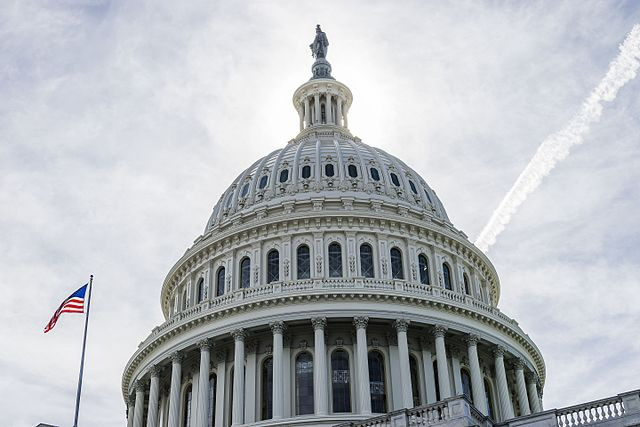The U.S. House of Representatives narrowly passed a $1.2 trillion federal spending package on Friday, taking a crucial step towards averting a partial government shutdown that would have begun at 12:01 a.m. on Saturday. The bill, which funds the government through September, now heads to the Senate, where it is expected to pass late Friday or over the weekend.
The spending package, comprised of six appropriations bills accounting for roughly 70% of discretionary government spending, was passed with bipartisan support in a 286-134 vote. More Democrats than Republicans supported the bill, with 106 GOP lawmakers voting in favor and 112 opposing it, while just 22 Democrats voted against the measure. The minority party's support has been crucial in recent months to keep the government open, highlighting both the fractures within the House Republicans and the political realities of a divided Congress.
House Minority Leader Hakeem Jeffries, D-N.Y., emphasized the importance of avoiding a government shutdown, stating, "We have a responsibility to make sure that the government is funded, and the six appropriations bills do so in a way that takes care of the health, the safety, the education and the economic well being of the American people."
The bill, however, faced intense backlash from ultraconservative lawmakers who criticized the deal for not including deeper spending cuts and GOP priorities on border and migrant policy. Rep. Chip Roy, R-Texas, called the bill an "abomination" and accused Republican leadership of a "total lack of backbone, total lack of leadership, and a total failure."
In a dramatic move, Rep. Marjorie Taylor Greene, R-Ga., filed a motion to vacate and oust House Speaker Mike Johnson from his position, citing his collaboration with Democrats to pass the funding bill. Greene characterized her action as "more of a warning and a pink slip," noting that the House won't have to vote on the motion until she decides to make it "privileged."
Another point of contention among conservatives was the fact that GOP leaders broke their promise to provide lawmakers with 72 hours to review legislation before voting on it. The spending agreement was unveiled early Thursday morning, giving members just over 30 hours to read the 1,012-page bill. Rep. Ralph Norman, R-S.C., criticized the rushed process, stating, "Don't vote on something you haven't read, that's the basis of anything."
Despite the conservative protests, Republican leaders touted several victories in the bipartisan compromise, including increased funding for border patrol agents and ICE detention bed capacity for migrants at the southern border, as well as halting funding for UNRWA, a United Nations relief agency providing aid to Palestinians in Gaza.
Democrats also celebrated their own wins, such as securing a $1 billion investment in child care and Head Start programs, as well as new funding for Alzheimer's and cancer research. Additionally, Democrats successfully fought off Republican demands for conservative policy add-ons, with Senate Appropriations Committee Chair Sen. Patty Murray, D-Wash., praising the defeat of "outlandish cuts" and "extreme policies."
As the spending bill moves to the Senate, the urgency to pass the legislation before the midnight deadline looms large. A weekend shutdown, while not likely to be highly disruptive for most Americans, would still mark another instance of government dysfunction and political brinkmanship.






